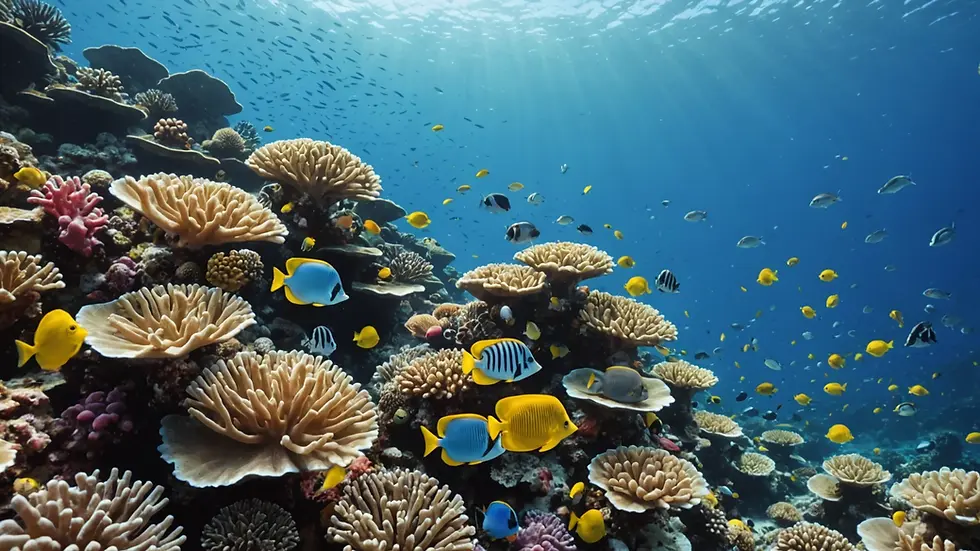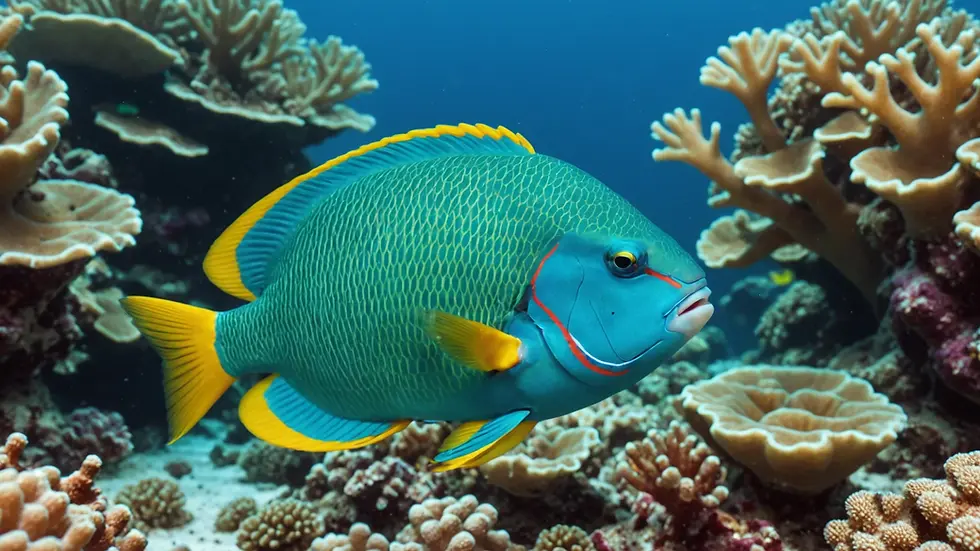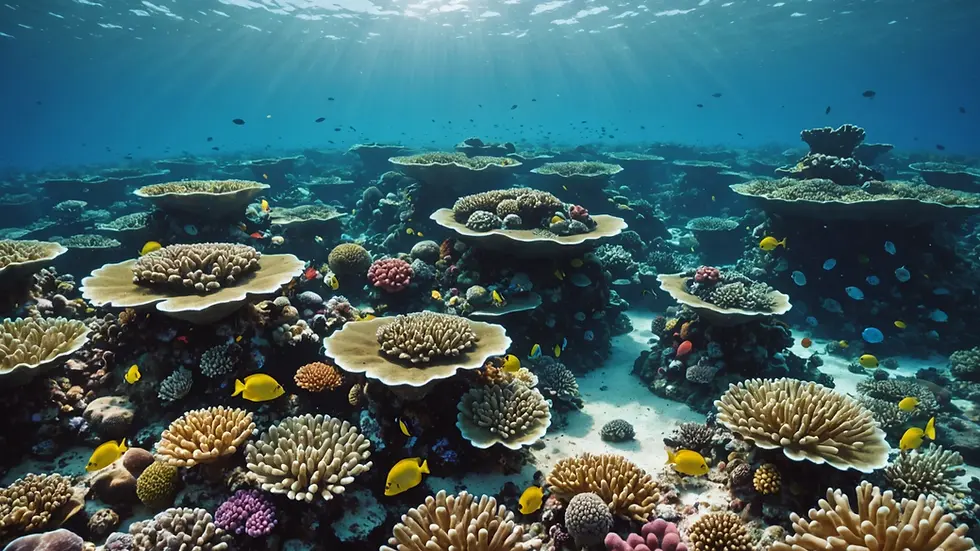The Intricate Dance: How Fish are the Unsung Heroes of Coral Reef Survival
- Jyotiraj Borah
- Feb 5
- 4 min read
Coral reefs are often known as the "rainforests of the sea," rich with colorful life. They cover less than 1% of the Earth’s surface but support about 25% of all marine species. Fish are at the heart of these ecosystems, playing crucial roles that directly influence coral health and sustainability. From keeping algae in check to maintaining species balance, fish are essential for the survival of these underwater wonders. This post uncovers the dynamic relationships between fish and coral reefs, emphasizing how fish contribute to the survival of these vital habitats.
The Role of Fish in Coral Reef Ecosystems
Fish inhabit coral reefs for food, breeding, and protection from predators. They thrive in the complex structures that corals provide, which serve as both shelter and abundant resources. Coral reefs are home to thousands of fish species, each fulfilling unique roles within the ecosystem. For example, parrotfish are avid grazers that consume algae, preventing it from overwhelming coral. Studies show that parrotfish can eat up to 5 tons of algae per acre each year. Without these fish, unchecked algae can block sunlight, ultimately stunting coral growth.
Fish as Herbivores: Grazers of the Reef
Herbivorous fish, such as parrotfish and surgeonfish, play a vital role in controlling algal growth on coral. By grazing on the various types of algae, they promote healthier coral. Healthy coral can outcompete other organisms for space and resources, which is critical for survival in crowded reef environments.
Without adequate herbivorous fish, algae can quickly cover coral structures, leading to a decline in reef health. Research indicates that herbivorous fish help sustain coral diversity by maintaining algae levels at approximately 5% of the reef area, creating a favorable environment for coral growth.
Fish as Predators: Maintaining Balance
In addition to herbivores, predatory fish are indispensable for sustaining reef diversity. Species like groupers and snappers help regulate the populations of smaller fish. This ensures no single species dominates the ecosystem, which could lead to imbalances that harm coral.
For instance, a study found that a 50% drop in predatory fish populations could lead to a 200% increase in certain prey species, resulting in overgrazing of algae on the reef. The health of coral reefs relies on the presence of predatory fish, demonstrating their critical role in maintaining ecological balance.
The Role of Fish in Coral Health
The relationship between fish and coral is mutually beneficial in several ways. Fish not only graze on algae but also participate in coral reproduction. Some species, like damselfish, help spread coral gametes during spawning events, increasing the likelihood of successful fertilization.
Additionally, nutrients from fish waste significantly contribute to coral health. Studies reveal that fish excrement can provide about 40% of the nutrients that corals require. This natural form of fertilization is essential for coral growth and resilience against environmental pressures.
Fish as Habitat Engineers
Certain fish species act as habitat engineers, transforming their environments through behaviors such as digging or nesting. For example, rabbitfish and wrasses burrow in the reef substrate, which helps aerate the sand and promote the growth of beneficial microorganisms that support coral.
These actions create new spaces for other marine species, boosting biodiversity and overall reef resilience. Such contributions illustrate the often-overlooked impact fish have on coral reef ecosystems.
The Impact of Overfishing
Overfishing remains a major threat to coral reefs. Removing herbivorous and predatory fish disrupts the delicate balance critical for coral health. In many areas, the loss of herbivorous fish has led to increases in algae coverage, causing coral mortality rates to rise by up to 70%.
When predators decline, there is often an unchecked rise in prey species, leading to overgrazing and further stressing the marine ecosystem. The interdependence between fish and coral emphasizes how vital fish are not only to their habitat but also to marine biodiversity as a whole.
Coral Reefs and Climate Change
Climate change intensifies threats to coral reefs, including those stemming from overfishing. Rising ocean temperatures increase the frequency of coral bleaching events, which leave corals vulnerable to disease. During bleach events, stressed fish may migrate away from their habitats or have fewer offspring, further exacerbating pressures on reefs that depend on stable fish populations.
A report indicated that coral reefs can lose up to 50% of their fish populations following severe bleaching events, underscoring the interconnectedness of fish survival and coral health.
Conservation Efforts and Their Importance
Understanding the relationship between fish and coral reefs is vital for effective conservation strategies. Protecting fish populations through marine protected areas (MPAs) helps restore coral reef ecosystems.
Successful conservation should entail sustainable fishing practices, habitat restoration, and protective measures for both fish and coral. Efforts to study fish behavior and ecology can provide critical insights that enhance conservation strategies, making them more effective.
Innovative Approaches to Coral Reef Conservation
Innovative conservation solutions are emerging, such as coral gardening. Here, resilient coral fragments are cultivated in nurseries before being transplanted onto reefs, aiding in coral population restoration. Research has shown that this method can lead to up to a 60% increase in coral survival rates.
Community involvement is also growing in conservation efforts. Local stakeholders often possess invaluable knowledge of their marine environments. Their engagement can foster more effective management practices and encourage a shared sense of responsibility for preserving local reefs.
The Future of Coral Reefs and Fish
While the challenges facing coral reefs and fish populations are significant, hope remains. Continued research and investment in sustainable practices can create a balanced relationship between human activities and marine ecosystems.
By fostering a better understanding of the interconnected roles that fish and coral play, we can develop strategies to protect these ecosystems. Our recognition of their mutual reliance is crucial for the health of coral reefs, ensuring their resilience in the face of ongoing environmental changes.
The Call to Action
Coral reefs, teeming with life, depend on fish for their survival. Fish are indeed the unsung heroes of these delicate ecosystems. Recognizing the integral roles fish play in coral health is vital for effective conservation.
To protect fish populations is to ensure coral reef sustainability. As we advocate for stronger conservation efforts, let us remember that the survival of these vibrant underwater ecosystems hinges on the intricate interaction between fish and coral. Together, we can secure the future of coral reefs for generations to come.







Comments